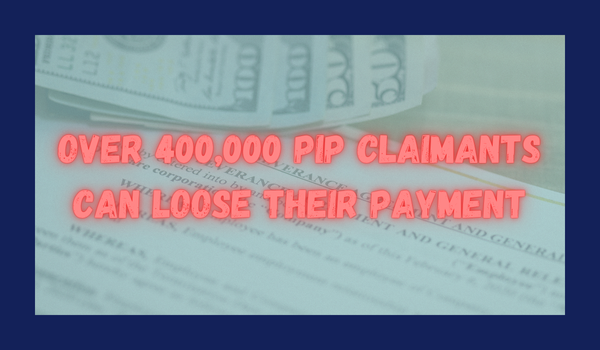Discover all the essential information concerning Over 400,000 PIP Claimants Can Loose Their Payment: Are Your One of Them? The Department for Work and Pensions delivers the Personal Independence Payment to around 3.5 million claimants. With the rapid increase in the economy, DWP has warned over 400,000 PIP claimants to face some payment reduction. This decision is concerned with the response to the higher number of claimants, for making the boost in the PIP program could lead to finishing some PIP payments. Continue browsing this article to know more about the Over 400,000 PIP Claimants Can Loose Their Payment, who they are, and more.
Over 400,000 PIP Claimants Can Loose Their Payment
PIP is a benefit designed to help people with long-term disabilities or health conditions that restrict their daily living activities or ability to manage communication needs. The benefits amount is specified by the harshness of your condition and its impact on your daily life.
Currently, DWP is proposing a bilateral approach to reform PIP. As Over 400,000 PIP Claimants Can Loose Their Payment. Before this review process, we will consider whether your current level of need aligns with the ongoing impact of your condition.
The Department for Work and Pensions is offering a more targeted procedure for awarding PIP in the future. This might involve replacing cash payments with alternative support like equipment or care services for specific conditions. Implementing a structured system with varying levels of support based on individual needs.
Are You One of Them?
While the specific declaration that Over 400,000 PIP Claimants Can Loose Their Payment remains unclear, some groups might be more sensitive to changes in their PIP awards.

If your condition has periods of improvement, the DWP might review this as justification to adjust your award. There are situations in which the reforms might not adequately address the challenges faced by individuals with mental health conditions.
The upcoming changes to PIP could significantly impact many claimants. While some might see no change or even an increase in benefits, others might face reduced awards or ending altogether. To stick to the support, you might need to ensure you continue to obtain the financial assistance you deserve.
What Do PIP Claimants Can Loose Their Payment Mean?
If your award is due for review, you’ll be contacted by the DWP. This could involve a face-to-face assessment or a review based on your medical records. Be prepared to provide evidence that supports your continued need for PIP.
Over 400,000 PIP Claimants Can Loose Their Payment, but if you want to continue with your PIP payments. Then you potentially lead to go through the review process, which could result in a few scenarios:
- If your condition remains the same and continues to significantly impact your daily life, your award amount might stay the same.
- If your condition worsens, you might be eligible for a higher award.
- If your condition has improved, or the DWP considers your current support level no longer necessary, your award amount might be reduced.
- In some cases, the DWP might decide you no longer qualify for PIP entirely.
These are some possible changes that can happen with any of the PIP beneficiaries.
Steps to Avoid PIP Payment
To get away from the Over 400,000 PIP Claimants Can Loose Their Payment. Here are some steps you can take to prevent the loss of payment:
- Gather evidence documentation that supports your ongoing need for PIP. This could include medical records, doctor’s letters, therapist reports, or anything that shows the limitations of your imposed.
- Seek support from citizens’ advice and other disability rights associations that offer free advice and support PIP claims and requests. Consider reaching out to them for advice throughout the review process.
- Staying updated on the leading DWP portal gives you essential designated information.
These are some steps you can take to save from losing PIP payment. Along with this, you are also required to consider the consultation period for the proposed reform. Therefore, the extra time required to implement the reforms has yet to be declared.
Continue Browsing CMI home to get more information.
